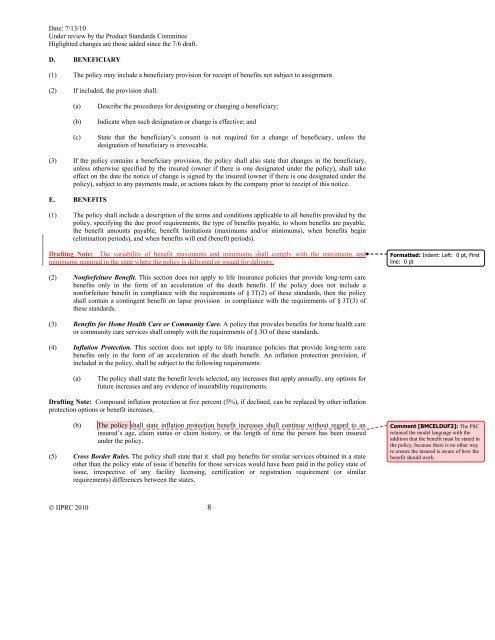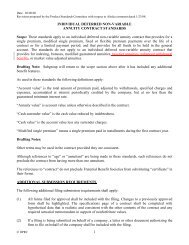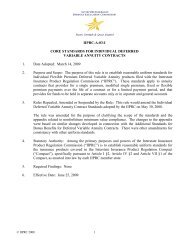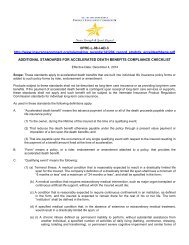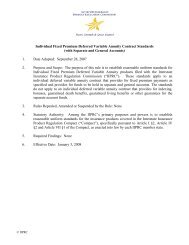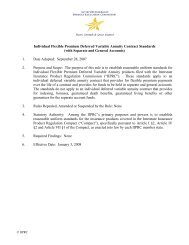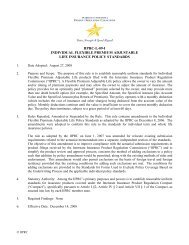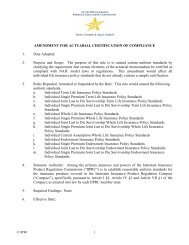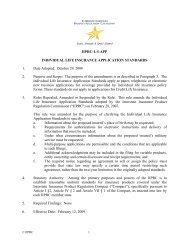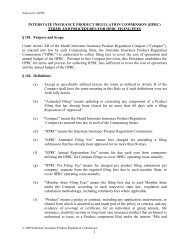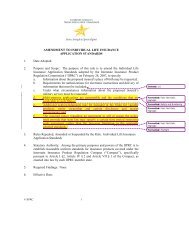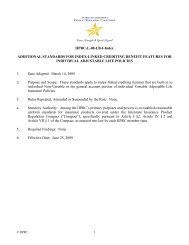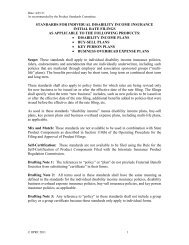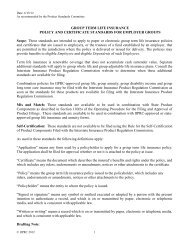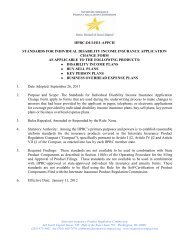core standards for individual long term care insurance policies
core standards for individual long term care insurance policies
core standards for individual long term care insurance policies
Create successful ePaper yourself
Turn your PDF publications into a flip-book with our unique Google optimized e-Paper software.
Date: 7/13/10<br />
Under review by the Product Standards Committee<br />
Higlighted changes are those added since the 7/6 draft.<br />
D. BENEFICIARY<br />
(1) The policy may include a beneficiary provision <strong>for</strong> receipt of benefits not subject to assignment.<br />
(2) If included, the provision shall:<br />
(a)<br />
(b)<br />
(c)<br />
Describe the procedures <strong>for</strong> designating or changing a beneficiary;<br />
Indicate when such designation or change is effective; and<br />
State that the beneficiary’s consent is not required <strong>for</strong> a change of beneficiary, unless the<br />
designation of beneficiary is irrevocable.<br />
(3) If the policy contains a beneficiary provision, the policy shall also state that changes in the beneficiary,<br />
unless otherwise specified by the insured (owner if there is one designated under the policy), shall take<br />
effect on the date the notice of change is signed by the insured (owner if there is one designated under the<br />
policy), subject to any payments made, or actions taken by the company prior to receipt of this notice.<br />
E. BENEFITS<br />
(1) The policy shall include a description of the <strong>term</strong>s and conditions applicable to all benefits provided by the<br />
policy, specifying the due proof requirements, the type of benefits payable, to whom benefits are payable,<br />
the benefit amounts payable, benefit limitations (maximums and/or minimums), when benefits begin<br />
(elimination periods), and when benefits will end (benefit periods).<br />
Drafting Note: The variability of benefit maximums and minimums shall comply with the maximums and<br />
minimums required in the state where the policy is delivered or issued <strong>for</strong> delivery.<br />
Formatted: Indent: Left: 0 pt, First<br />
line: 0 pt<br />
(2) Non<strong>for</strong>feiture Benefit. This section does not apply to life <strong>insurance</strong> <strong>policies</strong> that provide <strong>long</strong>-<strong>term</strong> <strong>care</strong><br />
benefits only in the <strong>for</strong>m of an acceleration of the death benefit. If the policy does not include a<br />
non<strong>for</strong>feiture benefit in compliance with the requirements of § 3T(2) of these <strong>standards</strong>, then the policy<br />
shall contain a contingent benefit on lapse provision in compliance with the requirements of § 3T(3) of<br />
these <strong>standards</strong>.<br />
(3) Benefits <strong>for</strong> Home Health Care or Community Care. A policy that provides benefits <strong>for</strong> home health <strong>care</strong><br />
or community <strong>care</strong> services shall comply with the requirements of § 3O of these <strong>standards</strong>.<br />
(4) Inflation Protection. This section does not apply to life <strong>insurance</strong> <strong>policies</strong> that provide <strong>long</strong>-<strong>term</strong> <strong>care</strong><br />
benefits only in the <strong>for</strong>m of an acceleration of the death benefit. An inflation protection provision, if<br />
included in the policy, shall be subject to the following requirements:<br />
(a)<br />
The policy shall state the benefit levels selected, any increases that apply annually, any options <strong>for</strong><br />
future increases and any evidence of insurability requirements.<br />
Drafting Note: Compound inflation protection at five percent (5%), if declined, can be replaced by other inflation<br />
protection options or benefit increases.<br />
(b)<br />
The policy shall state inflation protection benefit increases shall continue without regard to an<br />
insured’s age, claim status or claim history, or the length of time the person has been insured<br />
under the policy.<br />
(5) Cross Border Rules. The policy shall state that it shall pay benefits <strong>for</strong> similar services obtained in a state<br />
other than the policy state of issue if benefits <strong>for</strong> those services would have been paid in the policy state of<br />
issue, irrespective of any facility licensing, certification or registration requirement (or similar<br />
requirements) differences between the states.<br />
Comment [BMCELDUF3]: The PSC<br />
retained the model language with the<br />
addition that the benefit must be stated in<br />
the policy, because there is no other way<br />
to ensure the insured is aware of how the<br />
benefit should work.<br />
© IIPRC 2010 8


